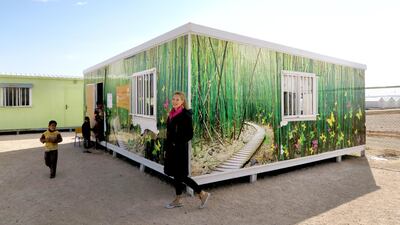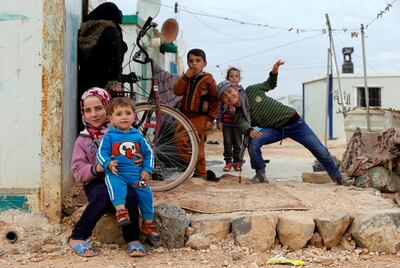To outsiders they may look merely like fashion-focused women, sitting on a plush sofa amid rails of glamorous dresses and kaftans in a Jumeirah villa in Dubai. But the topic of their discussion is far less frivolous than you might expect. Words such as "sustainability", "solar power", "cognitive development", and "refugee camps" are uttered as the women devise the next stages of their philanthropic plan.
Nadine Arton, Lina Boualwan and Christine Vorster are in the final phase of implementing the latest initiative for their charity, The Amal Project: portable play stations for underprivileged children in conflict zones, created from recycled shipping containers. The structures will be solar-powered and will contain items to promote the physical, social and cognitive development of children from the ages of 2 to 5.
"Early childhood development [ECD] is core for any child, to ensure that they are equipped globally to be able to go into the schooling system and have a successful life ahead because more than 90 per cent of brain development takes place in the first five years of a child's life, and 50 per cent of children who don't get ECD do not complete school," Vorster says.

Supported by the Switzerland-registered Global Citizen Foundation, The Amal Project was launched in 2015 to provide support for children at the Zaatari refugee camp in Jordan, and has extended outside of conflict areas to underprivileged communities such as the one Nina lives in in Cape Town.
Arton, the clothing designer behind Dubai-based label Glam on You, worked in journalism and diplomacy before entering the fashion world. Boualwan was also working in fashion. They both met Vorster – their yoga instructor, who had a background in missionary work and marketing – and hit it off.
"We realised, in general, there is nothing really done for the small children – they start at schools from age 6 onwards, but for the kids under 6, there is basically nothing done for them," Arton says. Before meeting Vorster, she and Boualwan began setting up recreational centre caravans in and around the Zaatari and Azraq camps, and also set up a centre within the White Hands Villa School in Jordan.
Now, the trio are working on a new, eco-friendly model for the caravans. "Having these containers done in one place, where everything fits, gets locked up, shipped and just put there – it's a super simple concept that would all be customised to that particular project," Arton says. "Inside, the tables can be folded up to make a play area, and there's a whiteboard
you can write or project on, there are toys, and everything."
“The most important thing for the container is for it to be sustainable and practical long-term – so it will be a solar, recycled container,” Vorster adds. “We’re making it as self-sufficient as possible, so it can run by itself, because most of the countries we focus on are underdeveloped or war zones or countries where natural disasters have taken place, and they don’t necessarily have water or electricity.”
In deciding where to set up, the women identify where the biggest need is for ECD, how feasible it is to go there. They are currently working on setting up the containers in India, Nepal, Botswana, Cambodia and Uganda, and hope to have five solar-powered play centres up and running by June.
“You do find certain countries, for example the Arab countries, where you’ll be surprised by the UN statistics in that those countries are actually OK [in terms of ECD], you have people already there, or it’s within the families, and children have books in their homes,” Vorster says. “In the countries we are focusing on right now, there is absolutely nothing – we choose where to go depending on where the highest demand is for children of that age.”
When The Amal Project first started setting up recreational centres for children, the women would travel to each country, shop for local supplies, check the quality of the goods, negotiate prices and make the purchases. But to do this in each country is time-consuming, so as to ensure the new solar-powered caravans will arrive to each designated location fully stocked and equipped. They will also arrange a partnership with an existing NGO in each locality to oversee the day-to-day running and management of the containers. "We don't just go and leave – we want to leave them running long-term," Arton says.
"The [Amal] project stands out because it shows a model of sustainability – with resources being left in the community that can be secured and used for many years to come – it is empowering for the local community and, in turn, will provide a resource that can be kept safe and used over the years," says Izak van der Merwe, Sports4U senior project manager. Sports4U frequently works on community projects to build AstroTurf sports fields and set up pop-up venues for educational programmes, and have partnered with the Amal Project to build these new solar-powered caravans.
“The solar-energy system that will be implemented within the play centres consists of photovoltaic [PV] cells, commonly known as solar panels and a battery back-up,” Van der Merwe explains. “The PV cells will be installed on the top of the units and will convert sunlight into direct current [DC] electricity. An inverter will then convert this current into usable electricity that will power the centre’s lights, the plugs for charging equipment and a projector that is used for educational screening and media time.”
_________________
Read more:
Children's education a casualty of war as conflicts interrupt studies for years
Healing the hurt in Syria one stitch at a time
Permanent resettlement is the only way to resolve the refugee crisis
_________________
Vorster estimates that it costs between Dh45,000 and Dh50,000 to create one fully equipped solar-powered play centre. "Companies can brand them, have the containers named after them and have their logos outside," she says, adding that the aim is to incorporate an easy-to-use donation model on the website, where visitors can select the items that they want their donations to cover. "So, you'll be able to break it down and choose what you want to pay for – like this box or that projector or all the books for one container, for example. You can pick and then know that this is yours there," she says.
The Amal Project doesn't fundraise in the UAE, but you can donate through the Global Citizen Foundation. "Anything counts," Boualwan says. The three women emphasise that donors feel connected with the project throughout its implementation, with open communication channels and photographs of their donations in use. It doesn't stop there. Arton's design background has played a role in the production of Amal Dolls, named after a red-headed girl she met in a refugee camp in Jordan, as well as trendy friendship bracelets. Proceeds from these sales are injected back into The Amal Project.

The women have also started putting together Amal Boxes, filled with educational and recreational supplies for children in need. Vorster recently presented some of these boxes to St Joseph's Children's Hospital for Chronically Ill Children in Cape Town.
While tangent initiatives by the Amal Project may aid children of all ages in hospitals and schools, the women say their first priority is targeting ECD. "It's proven that these first few years provide the entire base for a human," says Arton. "And it's not paid enough attention to."


